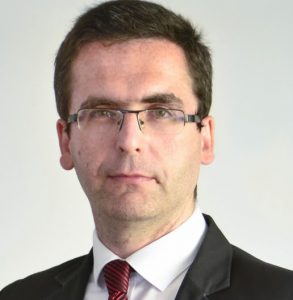Levente Kovács
Between 2000 and 2006, he was a full-time assistant professor at the Technical University of Timisoara; in the meantime (2001-2004) he was a lecturer at the Partium Christian University of Oradea. From 2005 to 2011, he was an assistant professor at the Budapest University of Technology and Economics (BME), from 2008 he was an assistant professor, then an associate professor. He defended his PhD dissertation at BME in 2008.
Since 2012, he has been an associate professor at the John von Neumann Faculty of Informatics (NIK) of Óbuda University (ÓE). He became a university professor in 2013 and became a full professor in 2016. He is a core member of the ÓE Doctoral School of Applied Informatics and Applied Mathematics and the University Doctoral and Habilitation Council, and the founder and head of the Physiological Regulation Research Center (PhysCon) of Óbuda University. Between 2012 and 2015, he was a János Bolyai scholarship holder of the Hungarian Academy of Sciences.
Between 2013 and 2018, he was the Deputy Dean for Education at the National Academy of Sciences. From 2018, he was the Deputy Rector for Education at the University of Budapest; from 2019, he was its Rector.
His research focuses on modern control theory and physiological regulation (primarily diabetes and cancer research), in which he has published more than 350 international journal articles and refereed international conference papers. He is an organizer and invited or plenary speaker at numerous foreign conferences. He is a reviewer of several international journals in the fields of control theory and health engineering.
Since 2009, he has been a member of the Institute of Electrical and Electronics Engineers (IEEE); since 2012, he has been a member of the Engineering in Medicine and Biology Society (EMBS) and the Systems, Man, and Cybernetics (SMC), and since 2013, he has been a member of the Control Systems Society (CSS). Since 2016, he has been the founding president of the IEEE SMC Cyber-Medical Systems professional body. Since 2010, he has been the member responsible for membership of the Hungarian organization of the IEEE, while since 2013, he has been the vice president of the organization, and since 2017, its president. Since 2015, he has been the president of the IEEE SMC Hungary Chapter (Hungarian branch); since 2018, he has been the founding president of the IEEE CSS Hungary Chapter. He is also a member of the biomedical (TC 8.2) and educational (TC 9.4) bodies of the International Federation of Automatic Control (IFAC). He has also been a member of the Hungarian Diabetes Society since 2010. In 2021, he was elected as a member of the Project Steering Committee (PIT) of the National Laboratory of Artificial Intelligence (MILAB).
He will be the president of the NJSZT (Neumann János Computer Science Society) from the end of 2024.
In 2009, he received the BME Rector's Award for his "TDK work" as a supervisor. In 2015, he was the winner of the EU's most competitive and innovative individual research grant, the European Research Council Starting Grant (ERC StG). In 2014 and 2018, the Scientific Council of the Hungarian University of Technology awarded him the "Researcher of the Year Award"; in 2018, the Ministry of Human Resources awarded him a ministerial certificate of recognition for his outstanding professional activities. In 2011, he was the first non-physician researcher to receive the Hetényi Géza Award at the XXIX Congress of the Hungarian Diabetes Society (MDT) held in Pécs. He was awarded the Officer's Cross of the Hungarian Order of Merit, Civil Division, in 2024.
- Married, father of 2 children. (2018 announcement.)
Created: 2017.01.31. 19:58
Last modified: 2024.11.26. 11:23

